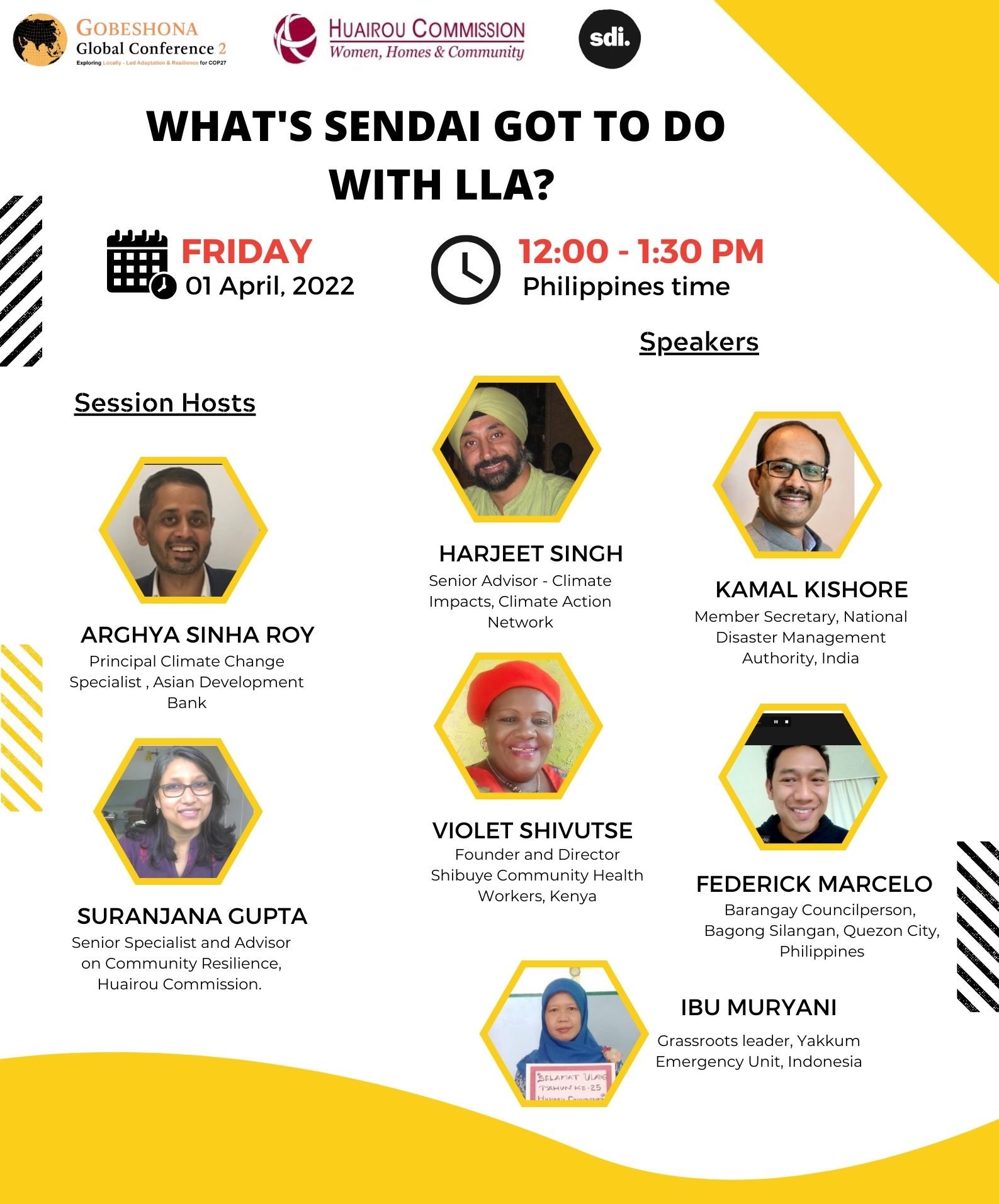“What’s Sendai got to do with LLA?” co-organised by the Huairou Commission

Organised by the Huairou Commission and Slum Dwellers international, this session demonstrated grassroots women’s resilience and DRR work to show how communities are implementing global frameworks like the Sendai Framework for DRR and Locally Led Adaptation on the ground. Session speakers highlighted the importance of recognizing, learning from and investing in holistic grassroots women’s initiatives as well as fostering partnerships between women’s groups and local governments.
Harjeet Singh, from CAN-International, spoke about the spectrum of risks that should be the starting point of both DRR and adaptation; how policy advocacy has to speak to the institutional priorities and agendas of global or national policy makers (and therefore must necessarily continue to use a more compartmentalized approach to ensure that governments and institutions are accountable), whereas implementation has to be tailored to the impact needed on the ground and needs to be approached in a more holistic /integrated manner.
Violet Shivutse, Founder and Coordinator of Shibuye Community Health Workers Kenya and Global Chair, Huairou Commission’s Governing Council, supported the idea of integrated risk management by linking food security, health, climate risks and hazards through the work they have been doing on the ground. Ibu Muryani, another grassroots leader from Yakkum Emergency Unit, Indonesia and Huairou member shared her experience in dealing with floods and how her women’s group is carrying out resilient livelihood diversification activities collectively to improve community nutrition, health and income in the face of disaster crises. Barangay councilperson, Fed Marcelo, spoke about how local communities in Quezon City of Philippines are using community mapping to monitor and give feedback to officials on their programs.
Kamal Kishore, who has extensive knowledge on policy formulation and implementation through his work at the National Disaster Management Agency of India spoke about the need for adaptive governance that is responsive to needs of local communities based on feedback loops (and creating a social demand for adaptive governance). He said that shifting policy directives in response to shifting risks and feedback need to seen publicly as adaptive governance (not indecisiveness). He spoke of the need to focus on horizontal coherence between organisations and institutions. Suranjana Gupta from the Huairou Commission brought up the issue of the accessibility of climate science and research to local communities, and how climate information can be used to inform local action.
Arghya Sinha Roy, Senior Climate Change Specialist (Climate Change Adaptation) from the Asian Development Bank summarised the key messages made by all the panelists and closed the session with the suggestion of facilitating more discussions with grassroots leaders and other stakeholders including climate scientists
Some key takeaways at the end of the session were:
- Broad strategies that are important for the implementation and scaling of Sendai Framework for DRR and Locally Led Adaptation:
- The need for communities to organise themselves.
- (Community) Risk mapping as a tool for empowerment that goes beyond the technicalities, and deepens the democratic processes by which grassroots communities negotiate their priorities and resources with the government. Risk mapping captures the entire spectrum of risks, climate science and local culture and socioeconomic norms.
- Formal recognition of grassroots communities as partners to the local government. In addition to delegating duties and filling gaps in government service delivery especially during emergencies/crises, this process also empowers communities.
- Key actions for improving governance and creating an enabling environment:
- Strengthening partnerships between local groups and local governments. Local governments can create an inclusive space for grassroots women and give them the authority to support the government’s work and influence and monitor local policy implementation.
- Strengthening feedback loops from the local level to inform national policies and promote adaptive governance in the context of changing risks.
- Institutionalize horizontal coordination between government departments and organisations.
- Key actions related to investments:
- Promote investments that finance processes and not just techniques
- Invest in building capacities of local communities as well as local governments.
- Invest in solutions that bring multiple benefits and address multiple risks (agriculture, food security, health etc.)
